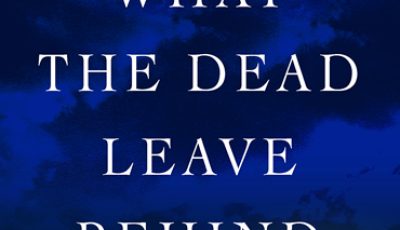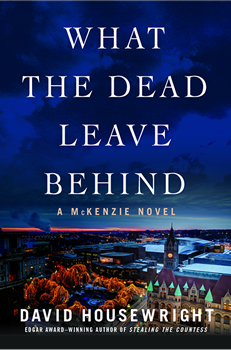

What The Dead Leave Behind by David Housewright
 Once a police detective in St. Paul, Minnesota, Rushmore McKenzie has become not only an unlikely millionaire, but an occasional unlicensed private investigator, doing favors for friends and people in need. When his stepdaughter Erica asks him for just such a favor, McKenzie doesn’t have it in him to refuse. Even though it sounds like a very bad idea right from the start.
Once a police detective in St. Paul, Minnesota, Rushmore McKenzie has become not only an unlikely millionaire, but an occasional unlicensed private investigator, doing favors for friends and people in need. When his stepdaughter Erica asks him for just such a favor, McKenzie doesn’t have it in him to refuse. Even though it sounds like a very bad idea right from the start.
The father of Malcolm Harris, a college friend of Erica’s, was found murdered a year ago in a park in New Brighton, a town just outside the Twin Cities. With no real clues and all the obvious suspects with concrete alibis, the case has long since gone cold. As McKenzie begins poking around, he soon discovers another unsolved murder that’s tangentially related to this one. And all connections seem to lead back to a group of friends the victim was close with. But all McKenzie has is a series of odd, even suspicious, coincidences, until someone decides to make it all that more serious and personal.
Author David Housewright was kind enough to discuss his latest thriller, WHAT THE DEAD LEAVE BEHIND, with The Big Thrill:
What do you hope readers will take away from this book?
Crime, especially murder, isn’t just about the victim, the killer, and the detective that brings the killer to justice. It’s also about all the people connected to these three protagonists.
How does this book make a contribution to the genre?
I like to think it;’s a good book and as such – I will occasionally come across people who tell me they don’t read mysteries (Garrison Keillor for example; which is a story for another time). My question is always the same – “Who have you read that brought you to this conclusion?” The answer is invariably “no one.” They don’t read mysteries because someone somewhere told that the genre wasn’t worth their time and they believed it. When that happens, I’ll usually provide a list of three authors and tell them to read these books. If they don’t like the books, okay, they don’t like mysteries. (The list tends to change depending on my mood. Right now it consists of Mystic River by Dennis Lehane, Ordinary Grace by William Kent Krueger, and The Friends of Eddie Coyle by George V. Higgins.) If they do like the books, I tell them to come back and I’ll give them another list. My great hope is that someone somewhere will put me on their list.
No spoilers, but what can you tell us about your book that we won’t find in the jacket copy or the PR material?
The crime at the center of the novel is ostensibly a “cold case” which leads to a second cold case which leads to a third. What connects them isn’t the victims or even the killers, but the friends, family, co-workers and business associates of the victims. The idea is that crime doesn’t just happen to one person but to everyone who cares about the victim. The question is “What do the dead leave behind?” The answer is “their stories.”
What authors or books have influenced your career as a writer, and why?
I suppose you could argue that I’ve been influenced by just about everyone I’ve read over the years – Elmore Leonard, James M. Cain, John D. MacDonald, James Lee Burke, Ross Thomas, Ross MacDonald, Ed McBain, James Crumley, and Lawrence Block to be sure, but also Kurt Vonnegut, E. L. Doctorow, Gore Vidal, Larry McMurtry, Patrick O’Brien, and Scott Fitzgerald. Good writing is where you find it.
*****
 A reformed newspaper reporter and ad man, David Housewright won an Edgar Award from the Mystery Writers of America (Penance) and three Minnesota Book Awards (Practice to Deceive, Jelly’s Gold, and Curse of the Jade Lily). His 19th novel – What The Dead Leave Behind – will be published in June 2017 (St. Martin’s Minotaur). He has also published a volume of short stories entitled Full House (Down & Out Books) and occasionally teaches novel-writing courses at the University of Minnesota and the Loft Literary Center in Minneapolis. Housewright was elected President of the Private Eye Writers of America in 2014.
A reformed newspaper reporter and ad man, David Housewright won an Edgar Award from the Mystery Writers of America (Penance) and three Minnesota Book Awards (Practice to Deceive, Jelly’s Gold, and Curse of the Jade Lily). His 19th novel – What The Dead Leave Behind – will be published in June 2017 (St. Martin’s Minotaur). He has also published a volume of short stories entitled Full House (Down & Out Books) and occasionally teaches novel-writing courses at the University of Minnesota and the Loft Literary Center in Minneapolis. Housewright was elected President of the Private Eye Writers of America in 2014.
To learn more about David, please visit his website.
- The Big Thrill Recommends: ORIGIN STORY by A.M. Adair - November 21, 2024
- Deadly Revenge by Patricia Bradley - November 21, 2024
- Unforgotten by Shelley Shepard Gray - November 21, 2024
